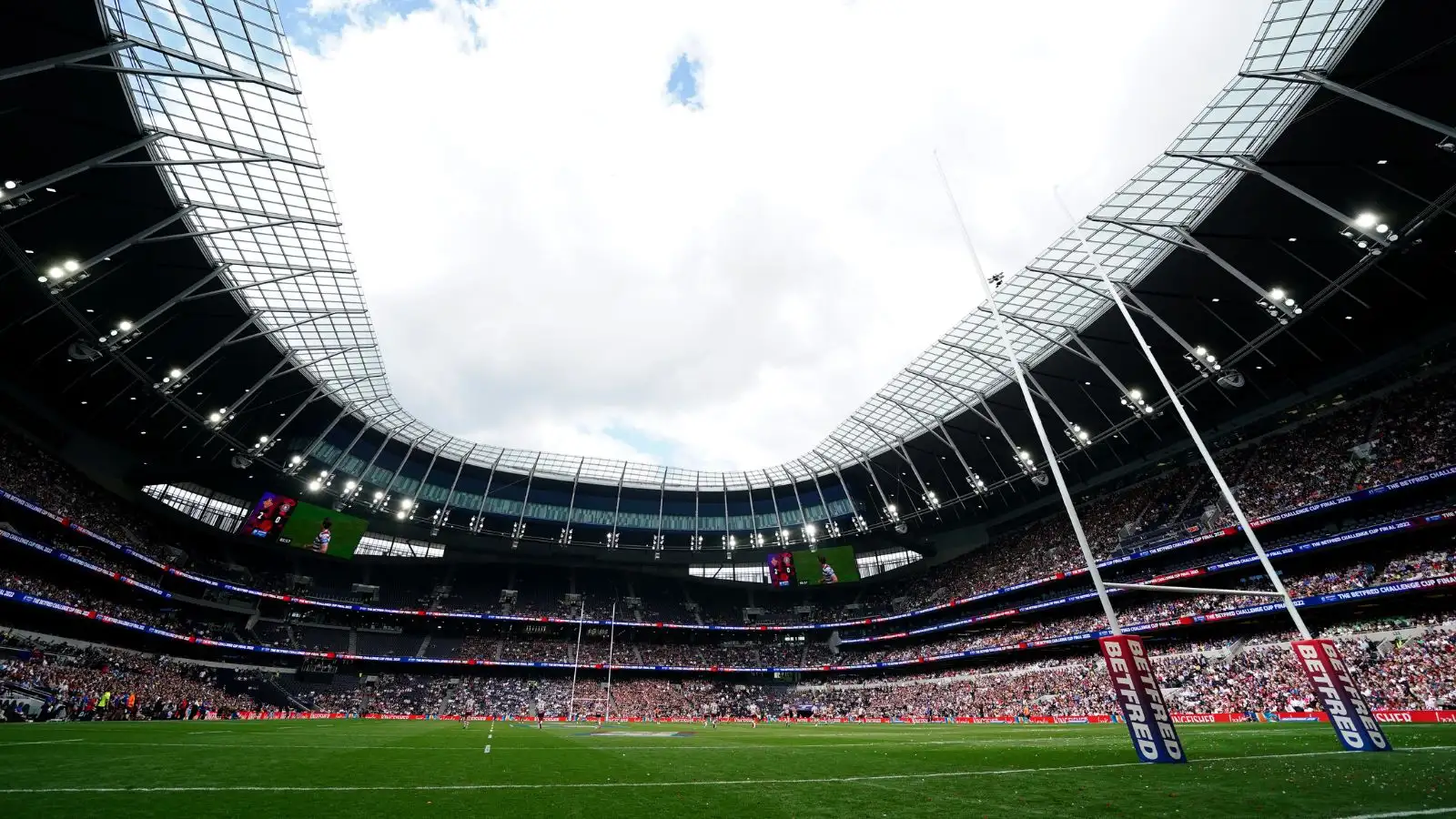RFL confirms near £1million loss for 2022; Four key areas identified including Challenge Cup tickets ‘below expectations’

Challenge Cup Final 2022 at the Tottenham Hotspur Stadium. Photo by Mike Egerton/PA Archive/PA Images.
The Rugby Football League has today shared its annual report and financial statements for 2022, resulting in a loss of £987,000.
It follows a profit of £1.059m for 2021.
Turnover was up by 70% from £24.764m in 2021 to £42.152m in 2022, largely contributed by the Rugby League World Cup in England – which was delayed by a year due to the pandemic.
Sponsorship increased from £1.668m to £5.744m, and Government funding from £8.351m to £11.030m, mainly due to grants received for delivery of the 2021 World Cup campaign.
The statement confirmed that distributions to clubs were significantly reduced from £8.356m in 2021 to £5.278m in 2022.
Four key areas were identified, of which insurance was the most significant. Costs rose from £705,644 in 2021 to £1,430,627 in 2022.
Central events are the next factor, with the Challenge Cup final and the mid-season international tests in Warrington both resulting in disappointing outcomes.
Tickets for the prestigious cup final between Wigan and Huddersfield at the Tottenham Hotspur Stadium fell ‘below expectations’ while England Men faced the Combined Nations All Stars last year ahead of the World Cup in warm-up matches, while the Women’s team played France.
The RFL’s restructuring was mentioned, while finally, the strategic report notes that the postponement of Rugby League World Cup to Autumn 2022 led to the refunding of “a substantial number of tickets which had already been purchased. Other revenue streams were also impacted in 2021 and did not recover in 2022 when the tournament was rescheduled. Clearly, while the RLWC2021 was rationalised during the latter part of 2021, there was certainly a cost of keeping the tournament functional during this period and retaining key members of the management team and staff.”
RLWC2021, a separate company but part of the RFL Group, therefore has its results included in the RFL’s draft Group 2022 Financial Statements.
Wheelchair, PDRL, LDRL and female participations increase, confirms RFL
In brighter news, the statement also confirmed that participation levels amongst the female, PDRL, LDRL and the wheelchair game has increased since the World Cup.
England Wheelchair were crowned champions following their 28-24 win over France in Manchester, while England became the first-ever Physical Disability Rugby League world champions after beating New Zealand in the PDRL World Cup final at the Halliwell Jones Stadium.
Marc Lovering, the RFL’s director of participation and development, said: “In addition to the £26.4m of capital investment enabled by the CreatedBy Capital Grants Programme, the RLWC2021 – the most inclusive Rugby League World Cup in history – has also driven a significant increase in participation particularly amongst female and Wheelchair athletes.
“The World Cup winning England Wheelchair RL squad have been very active in various community initiatives in the aftermath of the tournament.
“This effort combined with well over 150 new wheelchairs delivered through CreatedBy has resulted in a 75% increase in participation compared with the same period in 2022. With England Community Lions also winning the inaugural Physical Disability World Cup, the number of registered PDRL players has increased by 60%; and there has been a 54% increase in the numbers of players taking part in Learning Disability Rugby League.
“The committed performances by the England Women’s team have helped to increase the numbers of women and girls participants in 2023 by 15% – again when compared with the same point last year. This figure will continue to rise once figures from the Rugbees programme, inspired by RLWC2021 and backed by Sport England, are factored in.
“The core community game [not including education and social] as a whole has seen a 6% increase to date with encouraging growth particularly amongst junior and youth players.”
READ NEXT: European Championships cancelled as international calendar left in tatters
FOLLOW: Keep up with all the latest on the Love Rugby League mobile app